27. Sailing to a New Land
What will you throw overboard?
| Themes |
General human rights
|
| Level of complexity |
Level 1
|
| Age |
8 – 13 years
|
| Duration |
45 minutes
|
| Group size |
8 – 20 children
|
| Overview |
The children imagine they are sailing to a new continent, but to get there they must choose to cast non-essentials overboard.
|
| Type of activity |
Prioritising, discussion
|
| Objectives |
• To evaluate what is essential for survival and development
• To separate wants from needs
• To connect human needs and human rights
|
| Preparation |
• Copy and cut out a set of Wants and Needs cards for each group; place in an envelope.
|
| Materials |
• Envelopes
• Copies of Wants and Needs cards
• Glue or sticky tape and sheets of paper
|
| Adapted from the activity Wants and Needs, developed by Centre for Global Education, York St John University, published in Our World Our Rights, Amnesty International, London, 1995. Origin: Pam Pointon, Homerton College, Cambridge |
Instructions
- Ask the children to imagine that they are about to set sail to a new continent. There are no people living there now, so when they arrive, they will be pioneers establishing a new country.
- Divide the children into small groups and give each group an envelope with all the Wants and Needs cards in, explaining that these are the things they are packing to take with them for life in the new country. Ask each group to open the envelope, spread out all their cards and examine them.
Variation: Provide a few blank cards and give the children an opportunity to add some additional things they think the might need or like to have.
- Explain that the boat is setting sail now and begin a narrative like this:
At first the trip is very pleasant. The sun is shining and the sea is peaceful. However, a big storm comes up suddenly, and the ship is rocking. In fact, it’s about to sink! You must throw three of your cards overboard to keep the boat afloat.
Ask every group to decide what to give up. Explain that they won’t be able to get these things back later. Collect the cards which have been ‘thrown overboard’, and put them together in one pile.
- Return to the narrative:
At last the storm is over. Everyone is very relieved. However, a weather report comes that a Category 5 hurricane is heading straight for the ship. If you are going to survive the hurricane, you must throw overboard another three cards! Remember: don’t throw away what you may need to survive in your new country.
As before, collect these cards and keep them in a separate pile.
- Return to the narrative:
That was a very close shave! However, we are almost at the new continent. Everyone is very excited. But just as we sight land on the horizon, a giant whale crashes into the boat and makes a hole in the side. You must make the ship even lighter! Throw away three more cards.
Collect and put these cards into a pile.
- Announce that finally they have reached the new continent safely and are ready to build a new country. Ask each group to glue their remaining cards onto a piece of paper so that everyone can remember what they are bringing to the new continent. Have you got all the things you need to survive? To grow and develop well?
- Ask each group to hang their sheet at the front of the room and explain what they are bringing to the new land. After each description, ask the whole group, “Are they missing anything they will need to survive? To grow and develop?”
Debriefing and evaluation
- Debrief the activity by asking questions such as these:
- What did you like about this activity?
- How did you decide what you could do without? What was essential?
- Were some decisions difficult? Which ones?
- Were there any disagreements as a group on what to keep and what to throw overboard? How did you solve these disagreements?
- Do all people have the same needs? Who may have different needs?
- What do you think about your final choices? Will you be able to survive in the new country? Will you be able to grow and develop well?
- How did your group decide what to throw away?
- Did the final result surprise you?
- If you had to do this activity a second time, would you throw away any different things?
- Emphasise that human rights are based on human needs: the things that every human being needs to survive, grow and develop well and live a life of dignity. Ask questions such as these:
- Did you have what you need to survive?
- Did you have what you need to grow and develop?
- What things did you want to have but decide were not essential?
- Emphasise that everyone needs all their human rights! Some are necessary to stay alive, such as food, medical care, clean water and shelter. But others are essential for people to live well and develop. It is not enough for anyone just to stay alive. Ask:
- Which cards represent things we might want but don’t have to have for survival?
- Which cards represent things we have to have for physical survival?
- Which cards represent things we might need to grow and develop well?
- What would happen in this new country if you didn’t have _____? (Choose several different examples from the cards.)
Suggestions for follow-up
- This activity is an excellent follow-up to ‘Rabbit’s Rights’, p. 141, which introduces human needs as a basis for human rights.
- Follow-up activities can include ‘A Constitution for Our Group’, p. 56 which discusses democratic rule making with the children.
Tips for the facilitator
- It is very important that the children do not assume from this activity that some human rights are less important than others and can be eliminated. In the debriefing emphasise the interdependence of rights.
- Emphasise that the things they discard cannot be regained and that the things they keep are needed to build a new country, not just survive until they are ‘rescued’.
- Some items are intentionally ambiguous to stimulate debate about what defines an essential item (e.g. a mobile phone might be seen as a luxury by some and a necessity for communication by others).
- Young children may have difficulty distinguishing what they want from what they need. Help them by emphasizing what they will require to survive in a new country.
Variations
- In the debriefing compare the cards ‘thrown overboard’ in each crisis. Ask the children what differences they see in people’s choices.
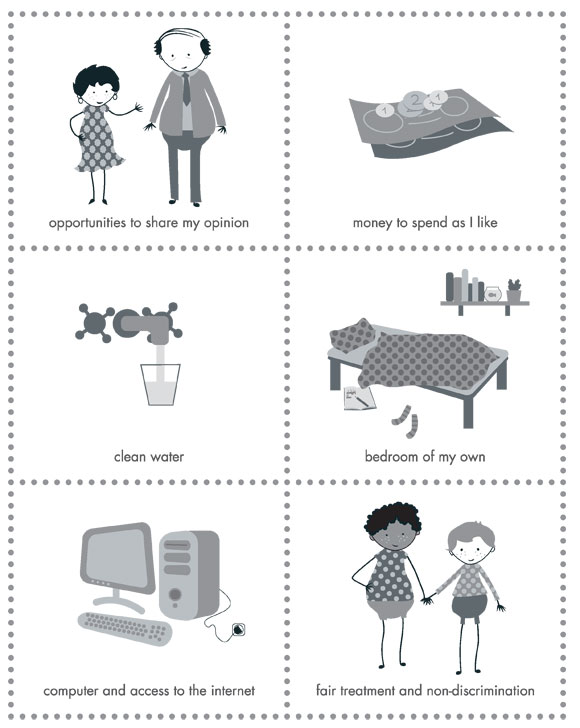
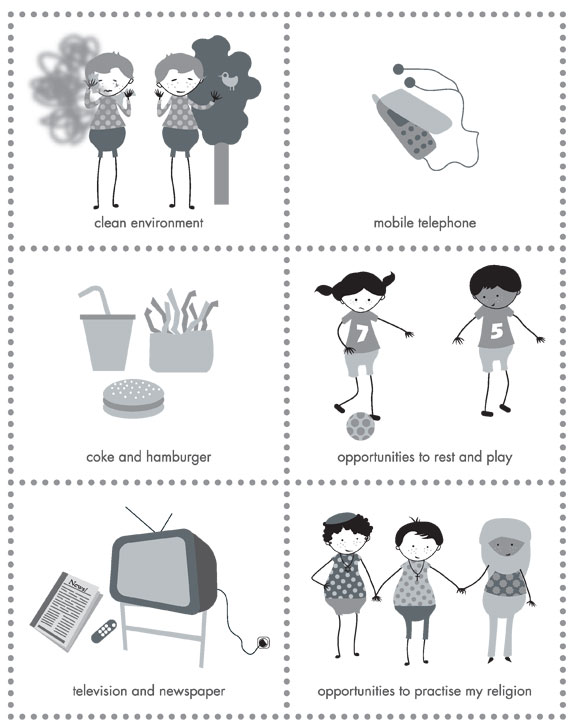
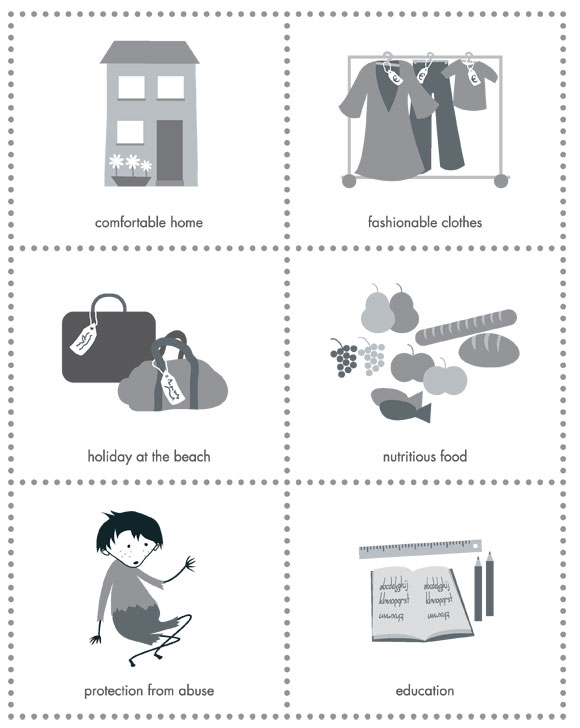
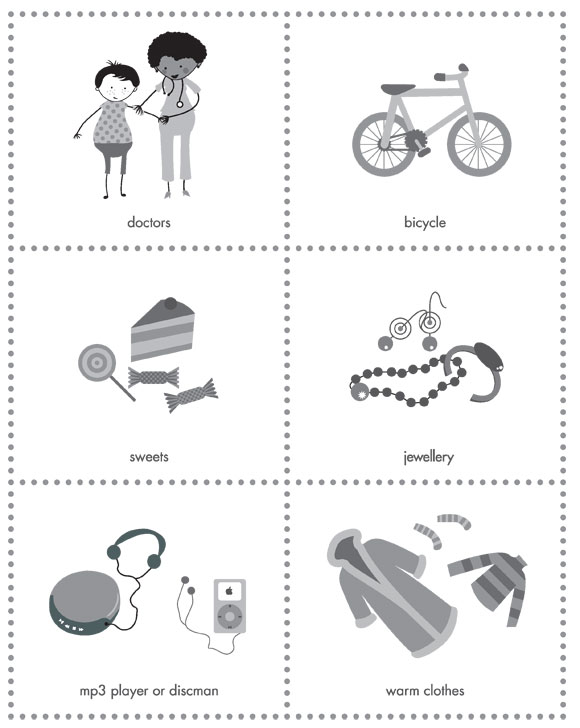
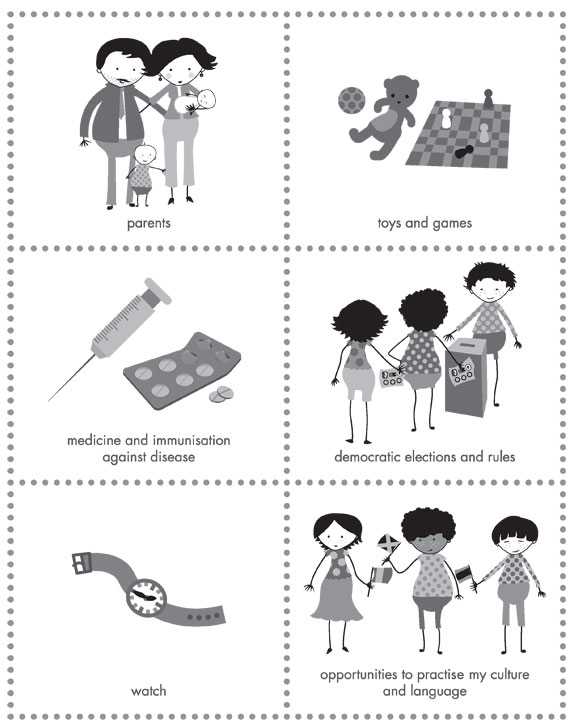
|